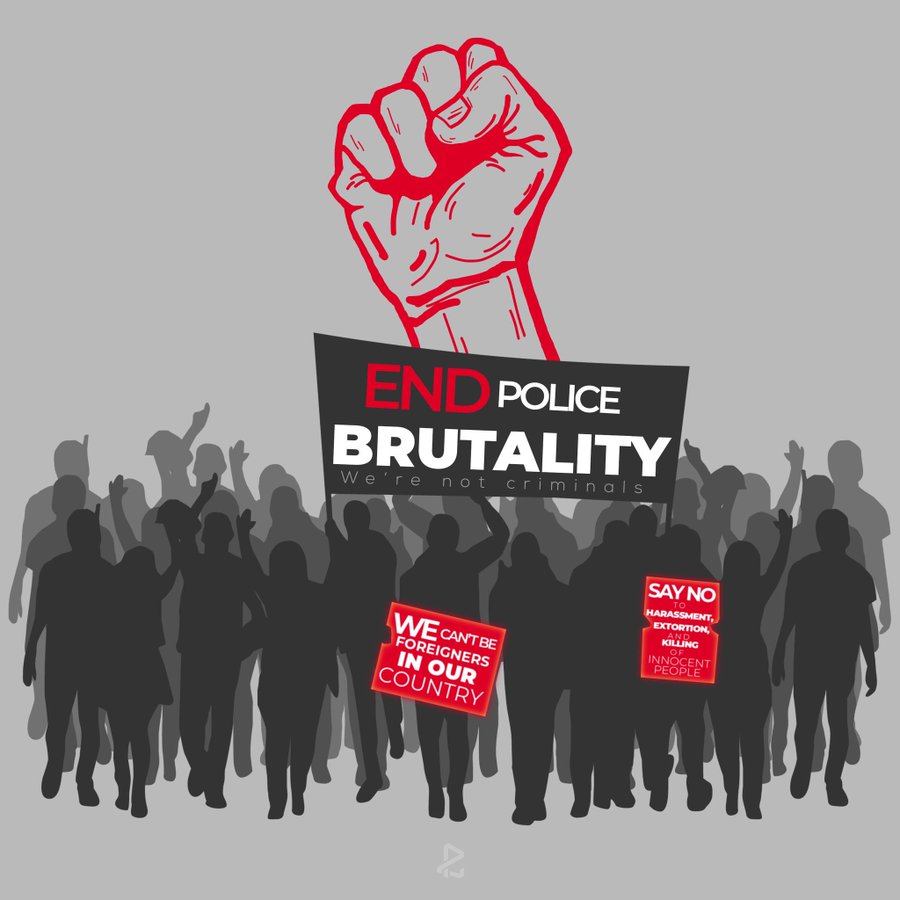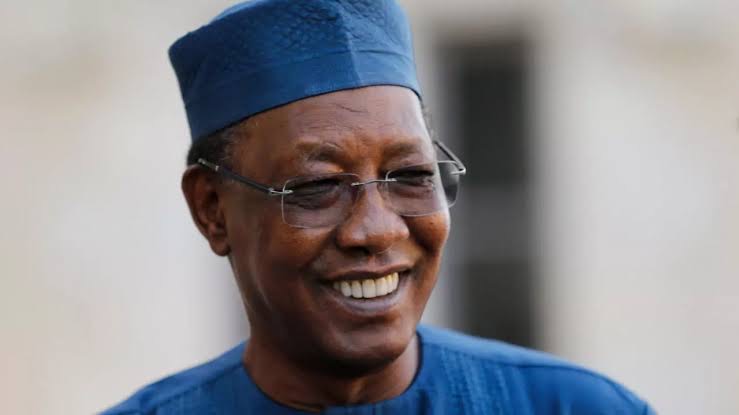Nigerians Are Protesting. Here Is What You Need To Know About #EndSARS

How did the #EndSARS protest start? On Saturday 22 February 2020, Kazeem Tiamiyu, the assistant captain of Remo Stars football club was killed by men of the special anti-robbery squad (SARS). The youngster was driving home with his friend when he was stopped by the officers and accused of being a fraudster. This was probably because of his dressing.
After showing them his ID card, the officers still insisted on taking him to their station. However, the route they took wasn’t leading to their station. Kazeem tried to struggle and was pushed out of the car and then hit by an approaching vehicle. This account is just one amongst the many cases of SARS harassment and police brutality in Nigeria. The culmination of these stories was the birth of #EndSARS protests.
The #EndSARS protest going on in Nigeria has drawn global attention in the past few days. While some barely know what the protest is all about and how the Nigerian people got to this point, this article seeks to educate every reader on the origin of this special police unit in Nigeria (SARS), their supposed functions as opposed to their actual function, and why Nigerians want to put an end to it right now.
The Genesis of The Special Anti-robbery Squad (SARS) in Nigeria

To the surprise of many, the special anti-robbery squad of the Nigerian police force was formed in 1992 by Simeon Danladi Midenda, a retired commissioner of the Nigerian police force. Mr. Simeon Danladi Midenda was the head of the anti-robbery unit of the state CID in Benin city. The unit’s popularity stems from curbing robbery incidents in Benin at that time. The good work of Mr. Simeon earned him an invitation to Lagos State, by the Inspector General of police to help replicate what he had done in Benin, in Lagos.
After he met with the Inspector General of police, he was charged with a responsibility to ensure that armed robbery in Lagos State came to a halt. To carry out this duty, he was handed fifteen fully armed men and two plain Peugeot wagons. In a bid to stand out from other anti-robbery units in place before his assignment, Mr. Simeon had to coin a new name for his team. Eventually, “The Special Anti-robbery Squad (SARS)” was born.
Modus Operandi of the then SARS Unit

After creation, the special anti-robbery squad went after robbers in Lagos State, undercover. They went in plain clothes, cars that are not in any way associated with the Nigerian police force, and without guns in plain sight. Their greatest weapon was the element of surprise and anonymity. Unsuspecting criminals always ran towards them while trying to escape from the traditional police and in the process, they meet their waterloo. They also carried out underground investigations without detection.
The under Mr. Simeon was a huge success. Therefore, the heads of the police force retained the unit and even integrate them into the policing system in Nigeria. If the SARS unit was a huge success, why is the #EndSARS trending now?
The Problem Today
The primary purpose of the SARS unit of the Nigerian police force was to fight and curb armed robbery. However, started acting outside their jurisdiction. Men of the special anti-robbery squad have gone rogue, harassing youths with impunity. Many erroneously believe that successful young Nigerians are into internet fraud. Consequently, owning an expensive phone, laptop, or car has become a crime. Sadly, fighting economic crime is strictly out of the jurisdiction of SARS operatives. The Economic and Financial Crimes Commission (EFCC) is the sole body responsible to investigate and prosecute financial crime.
The #EndSARS Protests and Promises
Over the years, Nigerians have endured the impunity of SARS operatives. Perhaps, this emboldened the officers. However, the incessant killings and abuse of power by SARS officers fuelled the first #EndSARS protest in December 2016. The protest was majorly carried out on social media and many Nigerians lent their voice to the struggle. Nevertheless, the heat died down within a few days, only to resurface at intervals from then up until 2018.
On August 14, 2018, the then acting president of Nigeria and current vice president, Professor Yemi Osibanjo ordered an overhaul of the SARS unit. This was due to multiple reports of human rights violation and killings. In his order, he stated that the unit must be reformed and proper investigation should be made as regards the reports of human rights violations. In the same vein and in the spirit of reform, the Inspector General of Police (IGP) announced a new head for the unit. Also, the IGP added that the controversial unit would be renamed to Federal Special Anti-Robbery Squad (FSARS).
Besides the name change, nothing else happened. In 2019, more citizens felt the wrath of the rogues operatives and the #EndSARS protest resurfaced. The IGP, Mohammed Adamu, ordered the immediate decentralization of the SARS unit of the police force. In his statement, the Deputy Inspector General Force Criminal Investigations and Commissioners of Police in each state will be held accountable for the actions of SARS in their area. However, it turned out to be mere rhetorics to calm frailed nerves.
The 2020 #EndSARS Protest

In early October 2020, a video of a man allegedly being killed by SARS officers surfaced. This spark ignited the current #EndSARS protest. However, unlike the previous online protests, youths took to the street. The first #EndSARS protest was held in Lagos State on October 8, 2020 with a demand for absolute scrapping of the unit. For three days, youths slept in front of residence of the Lagos State government, demanding to see the governor.
The #EndSARS protest began with a few protesters in attendance. However, with celebrities like Falz, Davido, Kanye West, Mesut Ozil, and Marcus Rashford lending their voice, it soon became a global struggle. In a few days, the protest spread to different parts of the country. Today, the #EndSARS protests has spread to over ten states in the country.
At some point, the protesters met police resistance. Sadly, lives were lost in some protest locations like Ogbomosho in Oyo State, Surulele in Lagos, etc. Nevertheless, the blunt force did not deter the protesters. After days of silence, the IGP on Sunday 10th October announced the disbandment of the SARS unit of police. However, it is evident that Nigerians are tired of mere promises. Therefore, the protest continued regardless of the promises.

The demands of the youths are straightforward. Popular as the #5for5, the demands are as follows;
- Immediate release of all arrested protesters
- Justice for victims of police brutality and adequate compensation for their families
- An investigation and prosecution of all officers guilty of misconduct
- Psychological evaluation and retraining of all members of the defunct SARS unit before redeployment to other units
- Increment in police salary as compensation for constantly protecting the lives and properties of citizens
The Government’s Response
So far, the government has agreed to some of the demands. The Inspector General of Police announced on the 13th of October 2020 that a new unit “Special Weapons and Tactics (SWAT) Team” will replace the abolished SARS unit of the police. He also odered all former personnel of the now defunct SARS to report to the Force headquarters in Abuja for debriefing, psychological and medical examination. The guidelines and mandates for the new Special Weapons and Tactics Team as follows;
- No personnel of the defunct SARS will be part of the new tactical team
- Operations of the new tactical team will be strictly intelligence driven
- Members of the new tactical will by no means embark on routine patrols
- Members of the new tactical team are barred from indiscriminate and unlawful searching of phones, laptops and other smart devices.
- Operatives of the new tactical team must be free of any pending disciplinary matter especially those relating to human rights violations.
However, this recent development doesn’t go down well with most Nigerians considering the fact that just changing the name of a unit and possibly retaining the individuals in it only amounts to a mere naming ceremony that doesn’t solve the problem. In fact, Nigerians have labelled SWAT an acronym for ‘SARS With Another Title’. They have also started a new trend to #EndSWAT.
The Bigger Picture
Indeed the journey of a thousand miles begins with a step. For Nigerian youths the #EndSARS protest is just the first leap in the right direction. In the bigger picture goes beyond ending SARS. The fight is a fight against all forms of police brutality and bad governance. Thus, they are already demanding accountability and slash of the bogus salaries of senators.
All Nigerians are asking is for the government to take actionable steps in ensuring that every unit of police becomes more effective and competent. They want a chance to stay alive, a safe community where the police truly is their friend, and is ready to protect them. Given the heterogenous nature of Nigeria, the future remains uncertain. However, the only sure thing is that this collective rage marks the beginning of a revolution. Perhaps, this will birth the new Nigeria that will stand tall as the giant of Africa.







Responses